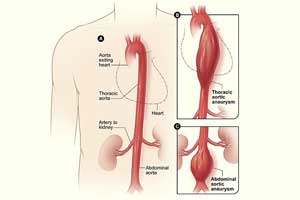- Home
- Editorial
- News
- Practice Guidelines
- Anesthesiology Guidelines
- Cancer Guidelines
- Cardiac Sciences Guidelines
- Critical Care Guidelines
- Dentistry Guidelines
- Dermatology Guidelines
- Diabetes and Endo Guidelines
- Diagnostics Guidelines
- ENT Guidelines
- Featured Practice Guidelines
- Gastroenterology Guidelines
- Geriatrics Guidelines
- Medicine Guidelines
- Nephrology Guidelines
- Neurosciences Guidelines
- Obs and Gynae Guidelines
- Ophthalmology Guidelines
- Orthopaedics Guidelines
- Paediatrics Guidelines
- Psychiatry Guidelines
- Pulmonology Guidelines
- Radiology Guidelines
- Surgery Guidelines
- Urology Guidelines
Montelukast may be a potential drug treatment for Aortic aneurysm

Professor Jesper Z. Haeggström and associates at Karolinska Institutet in Sweden have reported that Montelukast, a common asthma drug can retard the development of aortic aneurysm in mice. At present there is no effective drug treatment available for Aortic aneurysm and Montelukast can be developed as a potential treatment for this serious condition. Researchers have published their findings in journal PNAS.
"Our results are exciting and open the way for a medical treatment of this serious vascular disease," says Professor Jesper Z. Haeggström at Karolinska Institute's Department of Medical Biochemistry and Biophysics.
An aortic aneurysm occurs when the wall of the body's largest artery, the aorta, weakens and swells. The disease progresses slowly and affects some 5 percent of men and 1 percent of women over the age of 60. The condition is largely symptom-free and is normally therefore not discovered until late in its development when it threatens to rupture and cause life-threatening haemorrhaging. There are currently no drugs for preventing and treating aortic aneurysm.
In earlier studies, the research group found high levels of particular inflammatory signal substances called leukotrienes in the vascular walls of patients operated on for aortic aneurysm. Leukotrienes drive inflammation and are known for their potential to cause asthma. Since the asthma drug montelukast blocks leukotrienes, the team decided to examine whether it could also have an effect on aortic aneurysm. Their studies on mice revealed that the treatment did indeed reduce the swelling of the aorta and reduced levels of an enzyme that can break down the vascular wall and a protein involved in inflammatory processes.
"This study is particularly interesting from a therapeutic perspective since montelukast is a safe drug with very few side-effects, which means it can be taken over a long period of time," explains Professor Haeggström. "In the study we used drug doses equivalent to those used in the treatment of asthma patients."
The researchers hope to be able to start a controlled clinical trial to test the drug's efficacy on patients with aortic aneurysm.
The study was conducted with researchers at Linköping University in Sweden and the Technical University of Munich, Germany and financed by the Swedish Research Council, Stockholm County Council, the Novo Nordisk Foundation, the Heart and Lung Foundation, the Ragnar Söderberg Foundation, Karolinska Institutet and the European Research Council (ERC).
For more details click on the link: Cysteinyl leukotriene receptor 1 antagonism prevents experimental abdominal aortic aneurysm. PNAS, 2018 DOI: 10.1073/pnas.1717906115
Next Story
NO DATA FOUND

Disclaimer: This site is primarily intended for healthcare professionals. Any content/information on this website does not replace the advice of medical and/or health professionals and should not be construed as medical/diagnostic advice/endorsement or prescription. Use of this site is subject to our terms of use, privacy policy, advertisement policy. © 2020 Minerva Medical Treatment Pvt Ltd